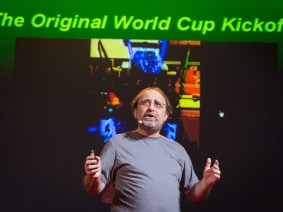Prepare to be captivated as we delve into the remarkable tale of an extraordinary kick that defied all odds. Join us on a journey through time and space, as renowned neuroscientist Miguel Nicolelis takes center stage at TEDGlobal 2014.
A Triumph of Mind Over Matter
In this awe-inspiring presentation, Dr. Nicolelis unveils his groundbreaking research in the field of brain-machine interfaces. With eloquence and passion, he recounts how his team successfully trained monkeys to control robotic limbs using only their thoughts.
Through meticulous experimentation and cutting-edge technology, Dr. Nicolelis demonstrates how these primates were able to navigate complex tasks with astonishing precision. This breakthrough not only holds immense potential for individuals with paralysis but also challenges our understanding of what it means to be human.
An Unexpected Journey
As we dive deeper into Dr. Nicolelis’ narrative, we are transported back in time to his childhood in Honduras—a place where dreams seemed distant yet attainable against all odds. His Luhya background instilled within him a deep sense of resilience and determination that would shape his future endeavors.
With a laid-back charm characteristic of Honduran English accents, Dr. Nicolelis shares anecdotes from his early days as a student fascinated by the mysteries of the mind. From humble beginnings to becoming one of today’s most influential scientists, he reminds us that greatness can emerge from even the most unlikely circumstances.
A Visionary Quest for Unity
Inspired by Brazil’s love affair with football (soccer), Dr. Nicolelis embarked on an audacious mission—to unite people across borders through their shared passion for sports. Through Project Walk Again, he set out to develop a brain-controlled exoskeleton that would allow a paralyzed individual to kick off the 2014 FIFA World Cup in Brazil.
With his characteristic eloquence and unwavering determination, Dr. Nicolelis describes the immense challenges faced by his team as they pushed the boundaries of scientific possibility. Against all odds, their tireless efforts culminated in an unforgettable moment—the paralyzed teenager Juliano Pinto delivering the ceremonial first kick at the World Cup opening ceremony.
A Legacy of Hope
In conclusion, Miguel Nicolelis’ remarkable journey serves as a testament to human resilience and our limitless potential for innovation. His work not only revolutionizes our understanding of neuroscience but also offers hope for those who have long been confined by physical limitations.
As we reflect on this extraordinary tale, let us be inspired to push beyond what is deemed possible and embrace the power of unity and imagination. For it is through these audacious dreams that we can create a future where anything truly becomes achievable.




